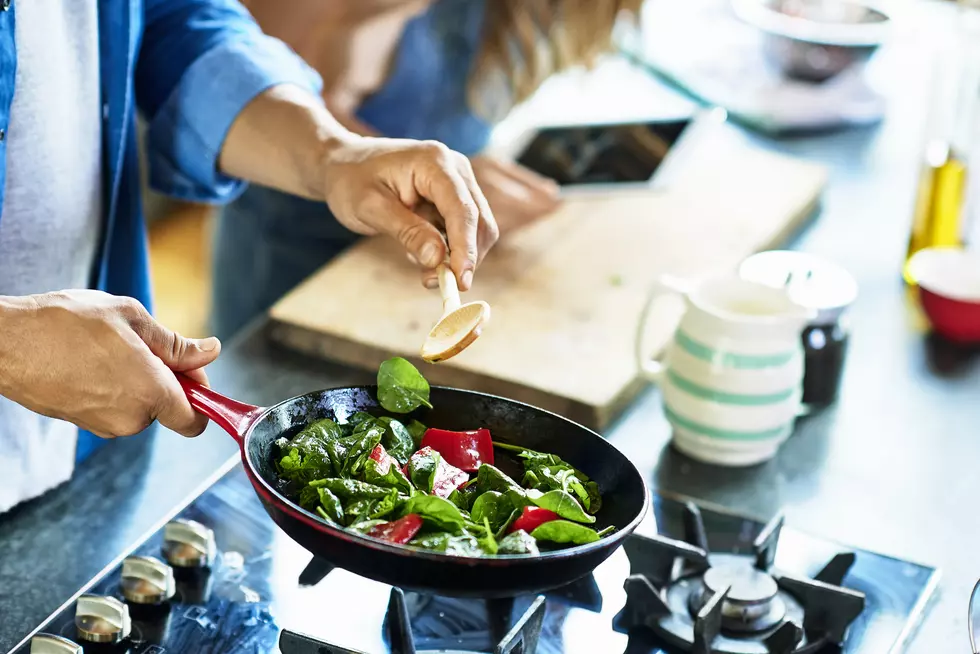
How Eating a Plant-Based Diet Helps You Be Your Healthiest, by a Cardiologist
Dr. Andrew Freeman is known as the Vegan Cardiologist, but to his patients, he is simply a great doctor who wants them to eat more plant-based to be their healthiest, both now, during the coronavirus pandemic, and later, when heart disease shows up. Convincing people to eat plant-based has gotten easier during the past year, one of the few upsides of the current health crisis, but he still feels compelled to amass all the latest research studies that show how a plant-based diet is healthier for your heart, your longevity, your immunity and every system in the body. So every year Dr. Freeman shares all the latest scientific studies and presents this scholarly research on plant-based eating to lower the risk of heart disease and cancer, among other ailments, to his peers and patients alike.
The problem is, how do you convince someone when you have their attention for just a minute or two? Here is Dr. Freeman's pitch, to you, to go plant-based, for your health now and later. For background, Dr. Freeman is an Associate Professor, Director of Cardiovascular Prevention and Wellness, and Director, Clinical Cardiology & Operations at National Jewish Health in Denver Colorado, and an advisor to The Beet. He is an advocate for a holistic approach to health, in the form of advocating whole food plant-based diet, regular exercise, and practicing mindfulness. We asked him how he gets people to understand that eating a whole food plant-based diet is healthiest, especially now. He took time out of his busy schedule and a new baby in the house to talk with us.
The Beet: How do you get patients to switch to a plant-based diet?
Dr. Freeman: Right now, people are obsessed with immunity, and plant-based eating is the smart choice. Dr. Kim Williams just published a major review article in the International Journal for Disease Reversal and Prevention about immunity, COVID, and the role lifestyle plays in disease outcomes. That article should make everyone want to go plant-based immediately to benefit their immunity. But it's even more convincing than that.
The idea is to eat for disease prevention. Think of it this way: When you move into a new house the carpeting is new, you don't think that every time you walk across the living room, you're wearing it out. but in time, you look down and suddenly notice the carpet is worn, and you realize you've been walking that same path every day and now you see the pattern taking its toll. The same thing is true of your body and diet. Today or the next day you won't notice the difference that a burger makes, but when you eat animal products every day for your whole life, it is wearing you down by causing chronic, systemic inflammation and worse: plague, and even allowing cancer cells to grow. Eating plant-based is simply healthier for every aspect of your health, long-term.
As a doctor, I see patients who come in and ask how to get rid of symptoms, how to reverse lifestyle diseases, especially markers for heart disease. And I want to explain to them: It's much easier and more effective to prevent these conditions before they start.
I just want to get people to see it. To come to this way of eating healthier as a realization: That a whole food plant-based approach is best. And I am all for eating for your best immunity since what is best for immunity is also what is best for your heart.
What is your best way of telling people to eat plant-based, in 2 minutes or less?
Dr. Freeman: If I'm at a dinner party we bring a dish that is plant-based or we cook at home. if we are the hosts, then everyone has to eat plant-based. Or if we are out to dinner at a restaurant a lot of people are curious and ask questions. But socially being plant-based can be isolating sometimes.
The bottom line, if I am sitting with someone who is said never say anything unless I am asked. Then I tell them:
1. Eating this way not only amazing for your health it puts your body in a state of anti-inflammatory which is the root cause of every disease. but also best for the planet and we are at one with our planet and we literally can't live without it.
2. It is the only diet that is proven to reverse or reduce or even halt the top two diseases in the US, which are heart disease and cancer.
3. What is good for immunity is also good for your heart health. The same diet, of eating plant-based foods full of antioxidants that boost immunity, is also great for heart-health.
The Beet: The hot topic right now is Inflammation in the body. Why is it so terrible?
Dr. Freeman: A lot of diseases are impacted by chronic inflammation: Heart disease, high blood pressure, type 2 diabetes, and cancer. Yet we don't actually see the damage until it gets to a point where it's already done the damage. When you're sore after you work out that's temporary inflammation. You take loads of Ibuprofen and you don't actually feel it.
Temporary Inflammation is there to help heal your body, so you get better to live another day. But chronic inflammation is what's bad. If I come in and kick you in the shin every day, in the same spot, it never gets a chance to heal. That is what junk food does it. It creates chronic, nonstop inflammation, and your body essentially never heals.
The Beet: Chronic inflammation on a cellular level causes hypertension?
Dr. Freeman: Yes! A huge proportion of the US has hypertension, half the public over 50 has it. Yet most people don't realize it until they have a stroke or a heart attack or develop kidney disease, or heart failure. In a lot of ways, hypertension is the model for modern medicine. Because it works insidiously, but by the time you realize it the damage is done. That's how we discover silent killers: Finally, the symptom shows up. It's true for the car and your home since if you get it regularly inspected, you'd find stuff that would not necessarily present a problem now. But it will cause big problems down the road.
An ounce of prevention is worth a pound of cure. That means you need to add more plants and get rid of meat while you're relatively healthy. People ask if they can only add plants and not take away meat: If I eat a cheeseburger and pile it high with veggies doesn't cancel out the bad stuff. But that would be like saying, You can have a little bit of poison and be okay. Over time that poison will kill you. So you want to eliminate the poisons and add beneficial foods.
Poisons don't kill you right away, and it's true of food too. If I eat a hot dog today I would be fine now, but if you do that or the equivalent every day until you turn 50 you are at a higher risk of having colon cancer. Genetics are not part of it. Of course, there are people who eat hot dogs and live to be 110. But in a lot of ways, this is a way of hedging against your genes.
The Beet: So eliminating all toxins in your body is a powerful way to stay healthy?
Dr.Freeman: Yes, and eating a diet full of plant-based nutrients, which helps to reverse the damage from your youth. Think of it this way: If you live in your home for 25 years one day you look down and the carpet is bare. It slowly but surely wore away. That's how your body responds to certain foods.
So people need to make changes as soon as they have the lightbulb moment. I have patients in their 80s who make this change, and the changes are extraordinary. I love it when my older patients say that to me. "Every time I see you, you are not aging and I am." And I just tell them that living this way gives your body the best chance at resiliency.
The Beet: What do you eat in a typical day?
Dr. Freeman. That's easy. It gets easier all the time. I love bean chili.... we just had a baby and our neighbors made bean chili for us, as a kindness. And then I add some salad to that for dinner. Or we will make homemade pasta with vegan pesto sauce.
For breakfast. I have cold brew coffee with unsweetened soy milk. And we had some bananas going bad so my wife made her favorite recipe for Banana walnut muffins and whole-grain flour. (It's from Is a Does It! Which is a great cookbook.
Lunch there's a food hall near my office and found a Filipino place with vegetables and rice. The truth is that everywhere you go, to restaurants and fast food places, you can find amazing vegan food now. There is a lot of serendipity when walking around your neighborhood. And everywhere you eat, you can find a plant-based option.
Locally there is a great restaurant in Denver called Somebody People. They do takeaway. What you realize is you are joining a community and this place has a supported agriculture share and you can get produce or prepared meals. When you start, you feel good about eating this way, for yourself and the planet.
There is no limit. These days it's so much easier. I went to Cornell and in the '90s and early 2000s and they were serving seitan and tofu and I thought it was whacky. It had not yet become mainstream. Now you don have to just go to health food stores. Now you can go everywhere and find delicious, healthy plant-based foods and love them.
The Beet: So bottom line? Do you think everyone should switch to go plant-based?
Dr. Freeman: They know somewhere in their heart of hearts that this is the best way to eat, but don't want to go for it yet, for some reason. When we were struggling students and eating all sorts of things I knew I needed to change my ways. You just know at the end of the day, inherently, that it's better for you to eat vegetables and fruits. But it took me a while until I got there. When you know this is how you should eat, make the switch.
I tell people if it's awkward, and you don't want to be rude, just blame your crazy cardiologist and say that is your reason. Blame me.
More From The Beet









